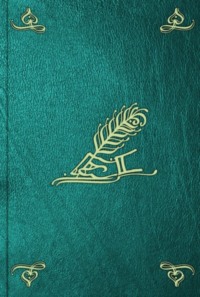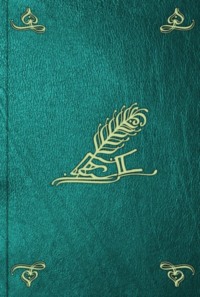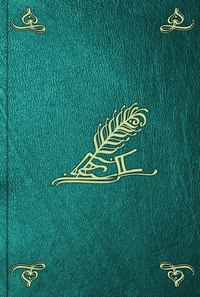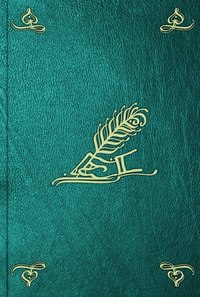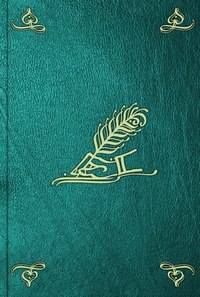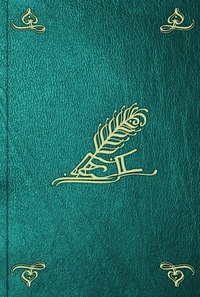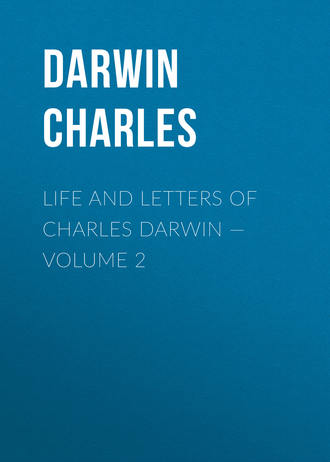 полная версия
полная версияLife and Letters of Charles Darwin — Volume 2
In a review in the December number of 'Macmillan's Magazine,' 1860, Fawcett vigorously defended my father from the charge of employing a false method of reasoning; a charge which occurs in Sedgwick's review, and was made at the time ad nauseam, in such phrases as: "This is not the true Baconian method." Fawcett repeated his defence at the meeting of the British Association in 1861. (See an interesting letter from my father in Mr. Stephen's 'Life of Henry Fawcett,' 1886, page 101.)]
CHARLES DARWIN TO W.B CARPENTER. Down, April 6th [1860].
My dear Carpenter,
I have this minute finished your review in the 'Med. Chirurg. Review.' (April 1860.) You must let me express my admiration at this most able essay, and I hope to God it will be largely read, for it must produce a great effect. I ought not, however, to express such warm admiration, for you give my book, I fear, far too much praise. But you have gratified me extremely; and though I hope I do not care very much for the approbation of the non-scientific readers, I cannot say that this is at all so with respect to such few men as yourself. I have not a criticism to make, for I object to not a word; and I admire all, so that I cannot pick out one part as better than the rest. It is all so well balanced. But it is impossible not to be struck with your extent of knowledge in geology, botany, and zoology. The extracts which you give from Hooker seem to me EXCELLENTLY chosen, and most forcible. I am so much pleased in what you say also about Lyell. In fact I am in a fit of enthusiasm, and had better write no more. With cordial thanks,
Yours very sincerely, C. DARWIN.
CHARLES DARWIN TO C. LYELL. Down, April 10th [1860].
My dear Lyell,
Thank you much for your note of the 4th; I am very glad to hear that you are at Torquay. I should have amused myself earlier by writing to you, but I have had Hooker and Huxley staying here, and they have fully occupied my time, as a little of anything is a full dose for me... There has been a plethora of reviews, and I am really quite sick of myself. There is a very long review by Carpenter in the 'Medical and Chirurg. Review,' very good and well balanced, but not brilliant. He discusses Hooker's books at as great length as mine, and makes excellent extracts; but I could not get Hooker to feel the least interest in being praised.
Carpenter speaks of you in thoroughly proper terms. There is a BRILLIANT review by Huxley ('Westminster Review,' April 1860.), with capital hits, but I do not know that he much advances the subject. I THINK I have convinced him that he has hardly allowed weight enough to the case of varieties of plants being in some degrees sterile.
To diverge from reviews: Asa Gray sends me from Wyman (who will write), a good case of all the pigs being black in the Everglades of Virginia. On asking about the cause, it seems (I have got capital analogous cases) that when the BLACK pigs eat a certain nut their bones become red, and they suffer to a certain extent, but that the WHITE pigs lose their hoofs and perish, "and we aid by SELECTION, for we kill most of the young white pigs." This was said by men who could hardly read. By the way, it is a great blow to me that you cannot admit the potency of natural selection. The more I think of it, the less I doubt its power for great and small changes. I have just read the 'Edinburgh' ('Edinburgh Review,' April 1860.), which without doubt is by — . It is extremely malignant, clever, and I fear will be very damaging. He is atrociously severe on Huxley's lecture, and very bitter against Hooker. So we three ENJOYED it together. Not that I really enjoyed it, for it made me uncomfortable for one night; but I have got quite over it to-day. It requires much study to appreciate all the bitter spite of many of the remarks against me; indeed I did not discover all myself. It scandalously misrepresents many parts. He misquotes some passages, altering words within inverted commas...
It is painful to be hated in the intense degree with which — hates me.
Now for a curious thing about my book, and then I have done. In last Saturday's "Gardeners' Chronicle" (April 7th, 1860.), a Mr. Patrick Matthew publishes a long extract from his work on 'Naval Timber and Arboriculture,' published in 1831, in which he briefly but completely anticipates the theory of Natural Selection. I have ordered the book, as some few passages are rather obscure, but it is certainly, I think, a complete but not developed anticipation! Erasmus always said that surely this would be shown to be the case some day. Anyhow, one may be excused in not having discovered the fact in a work on Naval Timber.
I heartily hope that your Torquay work may be successful. Give my kindest remembrances to Falconer, and I hope he is pretty well. Hooker and Huxley (with Mrs. Huxley) were extremely pleasant. But poor dear Hooker is tired to death of my book, and it is a marvel and a prodigy if you are not worse tired — if that be possible. Farewell, my dear Lyell,
Yours affectionately, C. DARWIN.
CHARLES DARWIN TO J.D. HOOKER. Down, [April 13th, 1860].
My dear Hooker,
Questions of priority so often lead to odious quarrels, that I should esteem it a great favour if you would read the enclosed. ((My father wrote ("Gardeners' Chronicle", 1860, page 362, April 21st): "I have been much interested by Mr. Patrick Matthew's communication in the number of your paper dated April 7th. I freely acknowledge that Mr. Matthew has anticipated by many years the explanation which I have offered of the origin of species, under the name of natural selection. I think that no one will feel surprised that neither I, nor apparently any other naturalist, had heard of Mr. Matthew's views, considering how briefly they are given, and that they appeared in the appendix to a work on Naval Timber and Arboriculture. I can do no more than offer my apologies to Mr. Matthew for my entire ignorance of this publication. If any other edition of my work is called for, I will insert to the foregoing effect." In spite of my father's recognition of his claims, Mr. Matthew remained unsatisfied, and complained that an article in the 'Saturday Analyst and Leader' was "scarcely fair in alluding to Mr. Darwin as the parent of the origin of species, seeing that I published the whole that Mr. Darwin attempts to prove, more than twenty-nine years ago." — "Saturday Analyst and Leader", November 24, 1860.) If you think it proper that I should send it (and of this there can hardly be any question), and if you think it full and ample enough, please alter the date to the day on which you post it, and let that be soon. The case in the "Gardeners' Chronicle" seems a LITTLE stronger than in Mr. Matthew's book, for the passages are therein scattered in three places; but it would be mere hair-splitting to notice that. If you object to my letter, please return it; but I do not expect that you will, but I thought that you would not object to run your eye over it. My dear Hooker, it is a great thing for me to have so good, true, and old a friend as you. I owe much for science to my friends.
Many thanks for Huxley's lecture. The latter part seemed to be grandly eloquent.
... I have gone over [the 'Edinburgh'] review again, and compared passages, and I am astonished at the misrepresentations. But I am glad I resolved not to answer. Perhaps it is selfish, but to answer and think more on the subject is too unpleasant. I am so sorry that Huxley by my means has been thus atrociously attacked. I do not suppose you much care about the gratuitous attack on you.
Lyell in his letter remarked that you seemed to him as if you were overworked. Do, pray, be cautious, and remember how many and many a man has done this — who thought it absurd till too late. I have often thought the same. You know that you were bad enough before your Indian journey.
CHARLES DARWIN TO C. LYELL. Down, April [1860].
My dear Lyell,
I was very glad to get your nice long letter from Torquay. A press of letters prevented me writing to Wells. I was particularly glad to hear what you thought about not noticing [the 'Edinburgh'] review. Hooker and Huxley thought it a sort of duty to point out the alteration of quoted citations, and there is truth in this remark; but I so hated the thought that I resolved not to do so. I shall come up to London on Saturday the 14th, for Sir B. Brodie's party, as I have an accumulation of things to do in London, and will (if I do not hear to the contrary) call about a quarter before ten on Sunday morning, and sit with you at breakfast, but will not sit long, and so take up much of your time. I must say one more word about our quasi-theological controversy about natural selection, and let me have your opinion when we meet in London. Do you consider that the successive variations in the size of the crop of the Pouter Pigeon, which man has accumulated to please his caprice, have been due to "the creative and sustaining powers of Brahma?" In the sense that an omnipotent and omniscient Deity must order and know everything, this must be admitted; yet, in honest truth, I can hardly admit it. It seems preposterous that a maker of a universe should care about the crop of a pigeon solely to please man's silly fancies. But if you agree with me in thinking such an interposition of the Deity uncalled for, I can see no reason whatever for believing in such interpositions in the case of natural beings, in which strange and admirable peculiarities have been naturally selected for the creature's own benefit. Imagine a Pouter in a state of nature wading into the water and then, being buoyed up by its inflated crop, sailing about in search of food. What admiration this would have excited — adaptation to the laws of hydrostatic pressure, etc. etc. For the life of me I cannot see any difficulty in natural selection producing the most exquisite structure, IF SUCH STRUCTURE CAN BE ARRIVED AT BY GRADATION, and I know from experience how hard it is to name any structure towards which at least some gradations are not known.
Ever yours, C. DARWIN.
P.S. — The conclusion at which I have come, as I have told Asa Gray, is that such a question, as is touched on in this note, is beyond the human intellect, like "predestination and free will," or the "origin of evil."
CHARLES DARWIN TO J.D. HOOKER. Down, [April 18th, 1860].
My dear Hooker,
I return — 's letter... Some of my relations say it cannot POSSIBLY be — 's article (The 'Edinburgh Review.'), because the reviewer speaks so very highly of — . Poor dear simple folk! My clever neighbour, Mr. Norman, says the article is so badly written, with no definite object, that no one will read it. Asa Gray has sent me an article ('North American Review,' April, 1860. "By Professor Bowen," is written on my father's copy. The passage referred to occurs at page 488, where the author says that we ought to find "an infinite number of other varieties — gross, rude, and purposeless — the unmeaning creations of an unconscious cause.") from the United States, clever, and dead against me. But one argument is funny. The reviewer says, that if the doctrine were true, geological strata would be full of monsters which have failed! A very clear view this writer had of the struggle for existence!
... I am glad you like Adam Bede so much. I was charmed with it...
We think you must by mistake have taken with your own numbers of the 'National Review' my precious number. (This no doubt refers to the January number, containing Dr. Carpenter's review of the 'Origin.') I wish you would look.
CHARLES DARWIN TO ASA GRAY. Down, April 25th [1860].
My dear Gray,
I have no doubt I have to thank you for the copy of a review on the 'Origin' in the 'North American Review.' It seems to me clever, and I do not doubt will damage my book. I had meant to have made some remarks on it; but Lyell wished much to keep it, and my head is quite confused between the many reviews which I have lately read. I am sure the reviewer is wrong about bees' cells, i.e. about the distance; any lesser distance would do, or even greater distance, but then some of the places would lie outside the generative spheres; but this would not add much difficulty to the work. The reviewer takes a strange view of instinct: he seems to regard intelligence as a developed instinct; which I believe to be wholly false. I suspect he has never much attended to instinct and the minds of animals, except perhaps by reading.
My chief object is to ask you if you could procure for me a copy of the "New York Times" for Wednesday, March 28th. It contains A VERY STRIKING review of my book, which I should much like to keep. How curious that the two most striking reviews (i.e. yours and this) should have appeared in America. This review is not really useful, but somehow is impressive. There was a good review in the 'Revue des Deux Mondes,' April 1st, by M. Laugel, said to be a very clever man.
Hooker, about a fortnight ago, stayed here a few days, and was very pleasant; but I think he overworks himself. What a gigantic undertaking, I imagine, his and Bentham's 'Genera Plantarum' will be! I hope he will not get too much immersed in it, so as not to spare some time for Geographical Distribution and other such questions.
I have begun to work steadily, but very slowly as usual, at details on variation under domestication.
My dear Gray, Yours always truly and gratefully, C. DARWIN.
CHARLES DARWIN TO C. LYELL. Down, [May 8th, 1860].
... I have sent for the 'Canadian Naturalist.' If I cannot procure a copy I will borrow yours. I had a letter from Henslow this morning, who says that Sedgwick was, on last Monday night, to open a battery on me at the Cambridge Philosophical Society. Anyhow, I am much honoured by being attacked there, and at the Royal Society of Edinburgh.
I do not think it worth while to contradict single cases nor is it worth while arguing against those who do not attend to what I state. A moment's reflection will show you that there must be (on our doctrine) large genera not varying (see page 56 on the subject, in the second edition of the 'Origin'). Though I do not there discuss the case in detail.
It may be sheer bigotry for my own notions, but I prefer to the Atlantis, my notion of plants and animals having migrated from the Old to the New World, or conversely, when the climate was much hotter, by approximately the line of Behring's Straits. It is most important, as you say, to see living forms of plants going back so far in time. I wonder whether we shall ever discover the flora of the dry land of the coal period, and find it not so anomalous as the swamp or coal-making flora. I am working away over the blessed Pigeon Manuscript; but, from one cause or another, I get on very slowly...
This morning I got a letter from the Academy of Natural Sciences of Philadelphia, announcing that I am elected a correspondent... It shows that some Naturalists there do not think me such a scientific profligate as many think me here.
My dear Lyell, yours gratefully, C. DARWIN.
P.S. — What a grand fact about the extinct stag's horn worked by man!
CHARLES DARWIN TO J.D. HOOKER. Down, [May 13th, 1860].
My dear Hooker,
I return Henslow, which I was very glad to see. How good of him to defend me. (Against Sedgwick's attack before the Cambridge Philosophical Society.) I will write and thank him.
As you said you were curious to hear Thomson's (Dr. Thomas Thomson the Indian Botanist. He was a collaborateur in Hooker and Thomson's Flora Indica. 1855.) opinion, I send his kind letter. He is evidently a strong opposer to us...
CHARLES DARWIN TO J.D. HOOKER. Down, [May 15th, 1860].
... How paltry it is in such men as X, Y and Co. not reading your essay. It is incredibly paltry. (These remarks do not apply to Dr. Harvey, who was, however, in a somewhat similar position. See below.) They may all attack me to their hearts' content. I am got case-hardened. As for the old fogies in Cambridge, it really signifies nothing. I look at their attacks as a proof that our work is worth the doing. It makes me resolve to buckle on my armour. I see plainly that it will be a long uphill fight. But think of Lyell's progress with Geology. One thing I see most plainly, that without Lyell's, yours, Huxley's and Carpenter's aid, my book would have been a mere flash in the pan. But if we all stick to it, we shall surely gain the day. And I now see that the battle is worth fighting. I deeply hope that you think so. Does Bentham progress at all? I do not know what to say about Oxford. (His health prevented him from going to Oxford for the meeting of the British Association.) I should like it much with you, but it must depend on health...
Yours must affectionately, C. DARWIN.
CHARLES DARWIN TO C. LYELL. Down, May 18th [1860].
My dear Lyell,
I send a letter from Asa Gray to show how hotly the battle rages there. Also one from Wallace, very just in his remarks, though too laudatory and too modest, and how admirably free from envy or jealousy. He must be a good fellow. Perhaps I will enclose a letter from Thomson of Calcutta; not that it is much, but Hooker thinks so highly of him...
Henslow informs me that Sedgwick (Sedgwick's address is given somewhat abbreviated in "The Cambridge Chronicle", May 19th, 1860.) and then Professor Clarke [sic] (The late William Clark, Professor of Anatomy, my father seems to have misunderstood his informant. I am assured by Mr. J.W. Clark that his father (Prof. Clark) did not support Sedgwick in the attack.) made a regular and savage onslaught on my book lately at the Cambridge Philosophical Society, but Henslow seems to have defended me well, and maintained that the subject was a legitimate one for investigation. Since then Phillips (John Phillips, M.A., F.R.S., born 1800, died 1874, from the effects of a fall. Professor of Geology at King's College, London, and afterwards at Oxford. He gave the 'Rede' lecture at Cambridge on May 15th, 1860, on 'The Succession of Life on the earth.' The Rede Lecturer is appointed annually by the Vice-Chancellor, and is paid by an endowment left in 1524 by Sir Robert Rede, Lord Chief Justice, in the reign of Henry VIII.) has given lectures at Cambridge on the same subject, but treated it very fairly. How splendidly Asa Gray is fighting the battle. The effect on me of these multiplied attacks is simply to show me that the subject is worth fighting for, and assuredly I will do my best... I hope all the attacks make you keep up your courage, and courage you assuredly will require...
CHARLES DARWIN TO A.R. WALLACE. Down, May 18th, 1860.
My dear Mr. Wallace,
I received this morning your letter from Amboyna, dated February 16th, containing some remarks and your too high approval of my book. Your letter has pleased me very much, and I most completely agree with you on the parts which are strongest and which are weakest. The imperfection of the Geological Record is, as you say, the weakest of all; but yet I am pleased to find that there are almost more geological converts than of pursuers of other branches of natural science... I think geologists are more easily converted than simple naturalists, because more accustomed to reasoning. Before telling you about the progress of opinion on the subject, you must let me say how I admire the generous manner in which you speak of my book. Most persons would in your position have felt some envy or jealousy. How nobly free you seem to be of this common failing of mankind. But you speak far too modestly of yourself. You would, if you had my leisure, have done the work just as well, perhaps better, than I have done it...
... Agassiz sends me a personal civil message, but incessantly attacks me; but Asa Gray fights like a hero in defence. Lyell keeps as firm as a tower, and this Autumn will publish on the 'Geological History of Man,' and will then declare his conversion, which now is universally known. I hope that you have received Hooker's splendid essay... Yesterday I heard from Lyell that a German, Dr. Schaaffhausen (Hermann Schaaffhausen 'Ueber Bestandigkeit und Umwandlung der Arten.' Verhandl. d. Naturhist. Vereins, Bonn, 1853. See 'Origin,' Historical Sketch.), has sent him a pamphlet published some years ago, in which the same view is nearly anticipated; but I have not yet seen this pamphlet. My brother, who is a very sagacious man, always said, "you will find that some one will have been before you." I am at work at my larger work, which I shall publish in a separate volume. But from ill-health and swarms of letters, I get on very very slowly. I hope that I shall not have wearied you with these details. With sincere thanks for your letter, and with most deeply felt wishes for your success in science, and in every way, believe me,
Your sincere well-wisher, C. DARWIN.
CHARLES DARWIN TO ASA GRAY. Down, May 22nd 1860.
My dear Gray,
Again I have to thank you for one of your very pleasant letters of May 7th, enclosing a very pleasant remittance of 22 pounds. I am in simple truth astonished at all the kind trouble you have taken for me. I return Appleton's account. For the chance of your wishing for a formal acknowledgment I send one. If you have any further communication to the Appletons, pray express my acknowledgment for [their] generosity; for it is generosity in my opinion. I am not at all surprised at the sale diminishing; my extreme surprise is at the greatness of the sale. No doubt the public has been SHAMEFULLY imposed on! for they bought the book thinking that it would be nice easy reading. I expect the sale to stop soon in England, yet Lyell wrote to me the other day that calling at Murray's he heard that fifty copies had gone in the previous forty-eight hours. I am extremely glad that you will notice in 'Silliman' the additions in the 'Origin.' Judging from letters (and I have just seen one from Thwaites to Hooker), and from remarks, the most serious omission in my book was not explaining how it is, as I believe, that all forms do not necessarily advance, how there can now be SIMPLE organisms still existing... I hear there is a VERY severe review on me in the 'North British,' by a Rev. Mr. Dunns (This statement as to authorship was made on the authority of Robert Chambers.), a Free Kirk minister, and dabbler in Natural History. I should be very glad to see any good American reviews, as they are all more or less useful. You say that you shall touch on other reviews. Huxley told me some time ago that after a time he would write a review on all the reviews, whether he will I know not. If you allude to the 'Edinburgh,' pray notice SOME of the points which I will point out on a separate slip. In the "Saturday Review" (one of our cleverest periodicals) of May 5th, page 573, there is a nice article on [the 'Edinburgh'] review, defending Huxley, but not Hooker; and the latter, I think, [the 'Edinburgh' reviewer] treats most ungenerously. (In a letter to Mr. Huxley my father wrote: "Have you seen the last "Saturday Review"? I am very glad of the defence of you and of myself. I wish the reviewer had noticed Hooker. The reviewer, whoever he is, is a jolly good fellow, as this review and the last on me showed. He writes capitally, and understands well his subject. I wish he had slapped [the 'Edinburgh' reviewer] a little bit harder.") But surely you will get sick unto death of me and my reviewers.
With respect to the theological view of the question. This is always painful to me. I am bewildered. I had no intention to write atheistically. But I own that I cannot see as plainly as others do, and as I should wish to do, evidence of design and beneficence on all sides of us. There seems to me too much misery in the world. I cannot persuade myself that a beneficent and omnipotent God would have designedly created the Ichneumonidae with the express intention of their feeding within the living bodies of Caterpillars, or that a cat should play with mice. Not believing this, I see no necessity in the belief that the eye was expressly designed. On the other hand, I cannot anyhow be contented to view this wonderful universe, and especially the nature of man, and to conclude that everything is the result of brute force. I am inclined to look at everything as resulting from designed laws, with the details, whether good or bad, left to the working out of what we may call chance. Not that this notion AT ALL satisfies me. I feel most deeply that the whole subject is too profound for the human intellect. A dog might as well speculate on the mind of Newton. Let each man hope and believe what he can. Certainly I agree with you that my views are not at all necessarily atheistical. The lightning kills a man, whether a good one or bad one, owing to the excessively complex action of natural laws. A child (who may turn out an idiot) is born by the action of even more complex laws, and I can see no reason why a man, or other animal, may not have been aboriginally produced by other laws, and that all these laws may have been expressly designed by an omniscient Creator, who foresaw every future event and consequence. But the more I think the more bewildered I become; as indeed I probably have shown by this letter.



